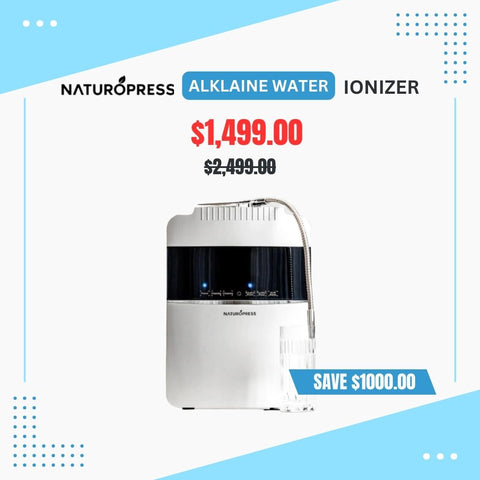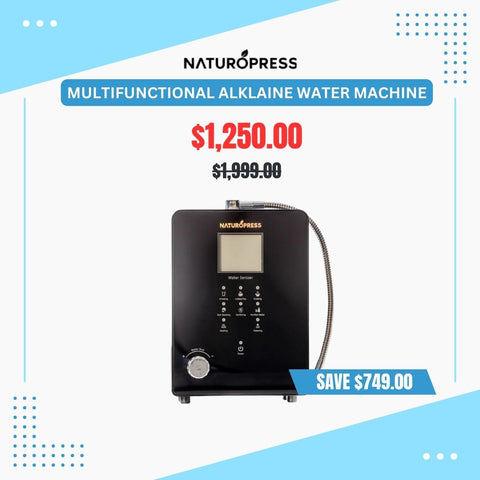With the increasing popularity of alkaline water, many people are on the hunt for the best alkaline water filter. This guide dives deep into the intricacies of choosing the ideal filtration system for your needs. Whether you're prioritizing water quality or the benefits of alkaline water, understanding the key elements to consider can be a game changer. Read on to make an informed decision for your household.
Understanding Alkaline Water
Alkaline water is believed to have a plethora of health benefits, from enhancing digestion to ensuring superior hydration. It contains natural alkaline minerals like calcium and magnesium which help balance the pH levels of drinking water. Curious about how alkaline water can combat the aging process? Discover the anti-aging benefits of alkaline water.
However, not all sources of alkaline water are created equal. For a more in-depth understanding, check out this article about keeping a pH balance body. It's important to choose the best alkaline water filter system to ensure you get all the essential minerals without the impurities.
Why Filtration is Essential for Tap Water

Tap water often carries various contaminants, including chlorine, fluoride, and heavy metals. Compare the differences between alkaline water vs. regular drinking water to see why a quality water filter removes these impurities, providing safe drinking water. Filtration systems not only purify but also enhance the taste of water, making it more palatable.
How Water Ionizers Work?
Water ionizers are devices that split water into acid and alkaline components using a process called electrolysis. The alkaline part of the water is what you drink, while the acidic part can be used for cleaning. When choosing a water ionizer, look for a filter that provides both purity and the right pH balance.
What to Consider When Checking Water Quality?
Water quality varies by source. From bottled water to well water, each source may have its own set of contaminants. Before choosing a filter, it's important to look at the water quality reports for your area. This helps in finding the best water filter that tackles specific impurities present in the water. Additionally, understanding where alkaline water comes from can offer further clarity.
Importance of Alkaline Minerals in Water Filters
A top-notch alkaline water filter not only purifies but also reintroduces essential alkaline minerals back into the water. Calcium and magnesium are crucial for many bodily functions, and having them in your drinking water can be beneficial.
Decoding the Filter Life: When to Change?
The longevity of water filters on the market can differ significantly. Some carbon filters may require replacements every few months, while others maintain their efficiency for years. When aiming for clean water, always verify the filter's lifespan before buying. For more insights, see this alkaline water ionizer comparison. Choose the best water purification method, keeping a watchful eye on replacement signs to guarantee pure water with the right minerals in the water. Remember, the best filter ensures consistent water quality over time.
Replacement Filters: Cost vs. Quality
When considering the best alkaline water purifier, initial expenses can be scary. However, one must also account for the cumulative costs as filters need regular replacement over the life of the filter.
Balancing between superior water quality and the frequency of filter changes is crucial to ensure you get water for the best value. A home water system that provides water consistently, meeting your daily need for water, and perhaps even offering a day money back guarantee can be a testament to its reliability and worth.
Hydrogen Water: The Next Big Thing?
Hydrogen water is gaining traction for its purported health benefits. Some advanced alkaline water filters now also produce hydrogen-rich water. Delve into the differences between hydrogen water vs. alkaline water to see what's right for you.
Ionizers vs. Alkaline Water Purifiers

While ionizers are popular, alkaline water purifiers offer multi-stage filtration to remove a wider range of contaminants. Depending on your water source and preferences, one may be more suitable than the other.
The Benefits of Drinking Alkaline Water
The journey water has to travel through many water treatment processes means that the water used in our daily lives can vary in quality. Want to know more? Here's an article discussing the health benefits of alkaline water. Alkaline water, specifically, has been associated with numerous health advantages, from enhancing digestion to ensuring superior hydration.
Investing in a quality alkaline water filter is capable of consistently providing essential alkaline minerals, ensuring you reap these health benefits. As filters are made differently, understanding your need for water and what each filter offers will help you choose the right one for healthy water.
Key Takeaways:
- Always consider your water source when choosing a filter.
- Remember to check the filter life and replacement costs.
- Alkaline minerals in your water can be beneficial for health.
- Ionizers and purifiers serve different needs; choose based on your preferences.
- Stay updated with advancements like hydrogen water to get the best for your health.
FAQs on Alkaline Water Filters
-
Alkaline water has a higher pH level compared to regular drinking water, typically ranging from 8 to 9, while pure water has a neutral pH of 7. This higher pH level implies that alkaline water is less acidic than regular water. For more insights on balancing pH, read about the importance of maintaining a healthy pH balance.
-
Alkaline water can be naturally sourced from springs or artificially made using machines. Naturally alkaline water contains essential minerals beneficial to the body, while artificially produced alkaline water can lack these vital minerals. If you're considering the artificial route, it's essential to select machines that ensure the presence of beneficial minerals in the water.
-
Drinking alkaline water during pregnancy is generally safe and can offer potential benefits for both the mother and the baby. However, it's crucial to ensure the water is purified and free from harmful contaminants. Natural alkaline water, sourced from springs, is rich in essential minerals and may be a better choice than bottled mineral water. For more on the differences, see this comparison of alkaline vs. spring water.
-
Alkaline water may help with acid reflux by neutralizing pepsin, reducing reflux symptoms, and improving hydration due to its acid-buffering capacity. Drinking water with a pH of 8.8 offers various potential benefits in the treatment of reflux disease. For a more in-depth look, check out the article on alkaline water for acid reflux and GERD.
-
Alkaline water is touted by many as a means to slow down the aging process. The consumption of alkaline water might help in slowing down the aging process due to its beneficial effects, such as neutralizing free radicals, balancing pH levels in the body, and improving hydration. Alkaline water's antioxidant properties and ability to detoxify the body may also contribute to its anti-aging benefits. Discover more about how alkaline water can slow down the aging process.



